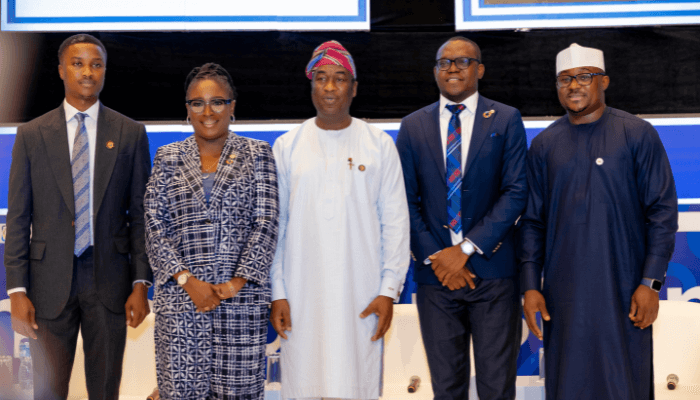...To get all news updates, Join our WhatsApp Group (Click Here)
Also Join our WhatsApp Channel (Click Here)
A 2022 report by the Office of Sustainable Goals revealed a startling statistic: about 3 million Lagosians, that is 10 percent of the total population, live in hard-to-reach or underserved communities.
This figure, compounded by the city’s rapid population growth, urbanisation, and projected rise in sea levels is posing a threat to the resilience of Lagos.
In a bid to change this narrative and build a resilient and sustainable Lagos State, Oreoluwa Finnih, the special adviser to Governor Babajide Sanwo-Olu on Sustainable Development Goals recently gathered stakeholders across the country to discuss how best to achieve sustainable development goals for Lagos State.
Themed ‘Building a Resilient and Sustainable Lagos,’ Finnih hinted that the Lagos State Sustainability Summit is symbolic of Nigeria’s unity and commitment towards achieving a sustainable future for Lagos and significantly reflects the country’s shared purpose, collective responsibility, and resoluteness in guaranteeing a better and more sustainable Lagos for future generations.
Finnih said the summit is only a result of a genuine collaboration and a thirst for excellence, adding that beyond this summit, she and her team have pooled resources, expertise, and resolve together to align their activities with the global Sustainable Development Goals (SDGs) and ensure that the vision of a sustainable and resilient Lagos becomes a reality.
This, she said, is because her commitment is not merely superficial; but demonstrated through the integrated policies, strategic partnerships, and concerted efforts that they are witnessing.
This summit, she said, is one major outcome and an example of these endeavours. The theme for this summit, ‘Building a Resilient and Sustainable Lagos’ was neither randomly decided, nor is it out of place. It is a deliberate choice that mirrors our ambition of Lagos Sustainability Vision.
“In fact, it is built around the Lagos State Office of Sustainable Development Goals (OSDG), fundamental principles of social responsibility, equitable development, and the creation of an enabling environment for sustainable growth and development.
“Building a sustainable Lagos has never been more important than now because of the surmounting pressures ahead. Going by the United Nations 2030 sustainability agenda, we are left with just six years to attain the sustainable development goals.
“Although Lagos remains ahead in the sustainability journey, we still face unique challenges that range from rapid urbanisation to a growing population, and increased vulnerability to the impacts of climate change,” Finnih explained.
She recognised the tireless efforts of three critical bodies who have been instrumental to the realisation of this summit: the Lagos State Office of Sustainable Development Goals (OSDG), the Lagos State Safety Commission, and the Lagos State Environmental Protection Agency (LASEPA).
She said the OSDG’s mandate has evolved to lead as the principal SDG coordinator in Lagos by championing initiatives that accelerate the attainment of the 17 goals. For us, sustainability is the practice of meeting today’s needs without compromising the future generation’s ability to meet their own needs.
She stressed that the OSDG execution strategy is and will remain characteristically innovative, inclusive, and practical.
Finnih said she and her team has refined strategy on four pillars: Strategic Planning which aligns state-level initiatives with global sustainability targets, resource mobilisation, which secures the financial, technical, and human resources including forming strategic partnerships, advocacy and awareness which engages all sectors on the importance of sustainability, and of course monitoring & evaluation to track their progress, assess impact, and make informed adjustments to meet her objectives.
In essence, she added that these pillars are directed towards the Lagos State Development Plan 2052, closely aligned with the SDGs, to reinforce our commitment to establishing Lagos as Africa’s Mega City.
For this cause, we have commissioned the OSDG Lighthouse Project, a flagship programme targeted at improving the livelihood of thousands of Lagosians in hard-to-reach or underserved communities.
“We have also commenced the Lagos Minds Project geared towards bettering the mental well-being of our teeming young population.
“We are also building a comprehensive data repository to guide the OSDG and other stakeholders in evidence-based decision-making.
“The OSDG has also designed a comprehensive framework and assembled a dedicated team for extensive monitoring and evaluation across both the public and private sectors. This is to compare our baseline and target outcomes and drive the change we seek,” she said.
During his keynote address, Rabiu Olowo, executive secretary and chief executive officer, Financial Reporting Council (FRC) of Nigeria said the FRC plays a crucial role in advancing sustainability practices through several key functions and initiatives which includes establishing and enforcing reporting standard, promoting best practices in corporate governance, training and education, facilitating transparency and accountability, monitoring and compliance, encouraging innovation and adoption of sustainable practice and collaboration with stakeholders.
Olowo mentioned five thematic levers for aligning financial strategies with the sustainable development goals to include better prioritization of resource allocation ( Budgeting), focusing on service delivery and outcomes, sustainable financing, economic empowerment and sustainability reporting.
He said FRC is not relenting on its efforts to promote and enforce sustainability practices, support innovation, and collaborate with various stakeholders.
“By doing so, we will help drive Nigeria’s transition towards a more sustainable and resilient future.
“The FRC alone cannot handle this task and that’s why partnerships like this are the only way to advance sustainability practices in Lagos. This is a responsibility that the FRC is happy to execute with all the seriousness that it deserves,” he added.
Also speaking at the summit, Babajide Olusola Sanwo-Olu, Governor of Lagos State said the summit serves as a pivotal moment to build consensus and forge new partnerships around the priorities shared.
Sanwo-Olu who was represented by Kadri Obafemi Hamzat, Deputy Governor, Lagos State said Lagos State Development Plan (2022–2052) sets the framework for our long-term vision. It emphasizes four key pillars: economic growth, human capital development, infrastructure expansion, and environmental sustainability.
At the heart of this plan, he said, is a commitment to using technology, innovation, and inclusive governance to build a city capable of adapting to an unpredictable future.
Sanwo-Olu said Lagos, like many urban centers worldwide, faces increasing pressures from rapid urbanization, climate change, and social inequality.
He said but instead of being daunted by these challenges, he sees them as opportunities to shape a Lagos that thrives on resilience and sustainability.
“Sustainability has always been central to our developmental agenda. In 2021, Lagos became the first sub-national government to activate the $1 trillion Nigerian Green Bond Market Development Program, paving the way for sustainable finance in urban development.
This bold move is more than just a financial milestone, It is a testament to our commitment to building a greener, smarter Lagos.
“Our Lagos Climate Action Plan sets ambitious targets to achieve net-zero emissions by 2050. It encompasses critical sectors such as energy, food systems, manufacturing, transportation, and urban infrastructure.
By mobilizing resources towards green projects, we are driving the systemic changes needed to foster sustainable growth without compromising our environment or the well-being of our people,” the governor explained.
He disclosed that Lagos is also pushing forward with projects such as the Circular Lagos Project, which promotes zero waste and a circular economy.
These initiatives, he said underscore its focus on long-term strategies that unlock the potential within the sustainability ecosystem and support Lagosians in living more harmoniously within the city.
Sustainability is not just about the environment; it is about creating a city that works for everyone. The future we envision for Lagos is one where no one is left behind. Our city planning must address the needs of all residents—urban and rural alike—and consider the cross-sectoral impact of our policies.
We are dedicated to creating public spaces and services that promote social interaction, safety, and inclusivity. Cities are made by people, and they must be for the people.
“This means ensuring that all residents, regardless of income or background, have
access to the resources and opportunities that will enable them to thrive,” Sanwo-Olu said.
https://www.linkedin.com/posts/oreoluwafinnih_lagossustainabilitysummit-sustainablelagos-activity-7239992144046751744-Zc4O?utm_source=share&utm_medium=member_android
You can get every of our news as soon as they drop on WhatsApp ...To get all news updates, Join our WhatsApp Group (Click Here)
Also Join our WhatsApp Channel (Click Here)

















